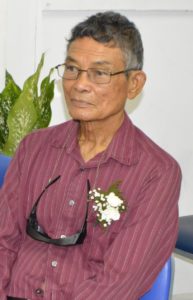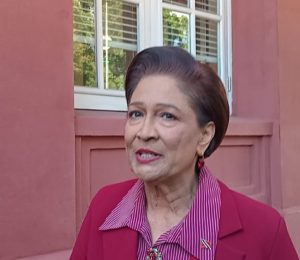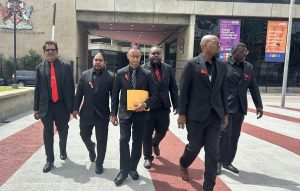By Prior Beharry
HE left a great legacy in the arts in Trinidad and Tobago.
The organisations that he founded or help establish like the National Drama Association of Trinidad and Tobago (NDATT), The Secondary Schools’ Drama Association, the San Fernando Arts Council, the San Fernando Festival (Sanfest) and the San Fernando Theatre Workshop are still in existence today.

James Lee Wah was vice principal of Naparima College in San Fernando from 1966 until his retirement in 1989. He was also a student at the school and taught English Language and English Literature. He passed away on Saturday at the age of 89.
Dr Allan McKenzie, who was principal during Lee Wah’s tenure at Naps, described him as not only a teacher but a thinker.
He said, “Because of his intelligence and his mind was free from prejudice, he looked at things with objectivity at all times. He was an excellent man in the school and his leaning was always toward drama.”
McKenzie said, “In the classroom he did his best to perpetuate the love of literature and brought an analytical approach to the study of literature.
“He did a considerable amount of work in the field of drama in South Trinidad and in theatre generally.”

David Sammy, a teacher at Naps who was also a student of Lee Wah, described him as not only an educator but a dramatist.
He said, “He left a great legacy in the Arts.”
Sammy said a number of actors who made their mark on the national scene were influenced by Lee Wah. They included Ralph Maraj, Tony Hall, Devindra Dookie, Dennis “Sprangalang” Hall and Errol Fabien.
He said Lee Wah was always pushing drama at Naparima and created an atmosphere “for it being like a school of drama and influenced a number of actors who passed through the school.”
Lee Wah was also civic minded and was instrumental in getting the quarrying stopped on San Fernando Hill.
Sammy said, “If wasn’t for him and I could say that because I was with him, there would not be any Naparima Hill today, it would have been flat. He lobbied not just on paper.”
Lee Wah had staged a one-man protest to stop quarrying on the landmark in the 1980s.

Former government minister and actor Ralph Maraj was a student of Lee Wah and also a dean at Naps when he was vice principal.
He said Lee Wah was one of the individuals who made an enduring impact on his life.
Maraj said, “I owe a huge debt of gratitude to the opportunities he gave me in theatre to explore and develop my talent.
“Had I not met James Lee Wah, my life would have turned out quite differently.”
He said, “There is no doubt that he has made a tremendous contribution to the cultural life of TT.
Maraj said Lee Wah was a pioneer in the theatre.
He said, “James Lee Wah was a man with a strong social conscience and he had tremendous respect and love for the environment and he found the denudation of the San Fernando Hill was a travesty, was a sin almost and he stood alone against that and was instrumental in having the quarrying stopped.”
Maraj said Lee Wah was also responsible for the link road from Gulf City to Lady Hailes Avenue.
As a literature teacher, Maraj said, Lee Wah, “was never dogmatic in the way he presented things, he allowed freedom of expression and allowed students to speak freely and to speak their minds and to develop their independent thought.”
He added, “Never dogmatic or overbearing or authoritarian, he was a true liberal.”
Comedian and television personality Errol Fabien said he was introduced to drama at Naps by Lee Wah.
“He had a sense, a notion, a vision for theatre in TT that he never saw in his lifetime.
“James knew that theatre was a way out for many people with respect to dealing with their emotional issues and their career and livelihood.
“He used theatre to help young men who were lost to find themselves and to know if they couldn’t make it academically, they could make it in the theatre and in the arts.”
![]()











